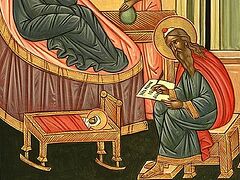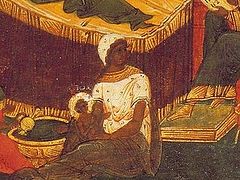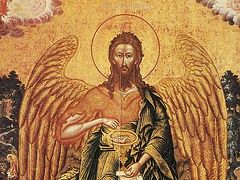In the name of the Father, the Son, and the Holy Spirit!
Dear brothers and sisters! Today we honor the memory and joyfully celebrate the glorious Nativity of the great Prophet of God and Forerunner of the coming of Christ, St. John the Baptist. The Lord Himself teaches us to honor and glorify St. John the Forerunner, saying that of those born of women, a greater than he has not arisen (cf. Mt. 11:11).
St. John was a prophet of God, the Forerunner and Baptist of our Savior Jesus Christ. And these worthy qualities were so great that he is rightly honored as one of the greatest saints in God’s Church—for of those born of women there was no one greater than him. Let us take a more thorough look at why he is greater than all.
First of all, St. John was not only a holy man and prophet, but as we already said, he was the Forerunner and Baptist of the Lord. This particular aspect greatly distinguishes him from the other Old Testament prophets and raises him above them. Other prophets saw the coming of Christ only from a distance and in shadows, and that is why they spoke of him vaguely, in symbols and oracles, and they all died without being vouchsafed to behold the Messiah Whom they foretold. But John the Baptist saw Him and spoke with Him face to face, and therefore he not only foretold, but confirmed and testified to His appearance, even being vouchsafed the honor of Baptizing Him; and through this he as if consecrated Him for the great service to mankind. Thus, he was more than a prophet—he was an earthly angel of God, whom the Heavenly Father sent before His beloved son to prepare His way (cf. Is. 40:3–5; Mal. 3:1; Lk. 3:4–6). He was a friend of the Son of God, entrusted to announce to people the coming of the promised Messiah and prepare them to receive Him. No other prophet had such a great honor, and this placed him higher than all those born of women.
But John the Baptist was great not only because of his high service, but by his personal character and his very life. The holy evangelists say of him that he led such a strict life, so fervently loved truth, and preached it to people with such great self-denial, but at the same time he was so modest and humble of heart, that in this sense he must be recognized as one of the greatest pleasers of God. According to the testimony of the evangelists, St. John abode in desert from his childhood, wore clothing made of camel hair and a leather belt, ate locusts and wild honey, taking even that in such meager amounts that people said of him that he didn’t eat or drink (cf. Mt. 11:18). To such amazing austerity of life he joined even greater moral purity, so that all the Jewish people considered him a great righteous one, and some even thought that he might be the Christ. History does not present another such man—all the prophets, holy in life and great in temperance though they be, were not so austere as John the Baptist.
Himself a great and righteous man, St. John zealously preached the truth and boldly rebuked people’s vices with complete self-denial. He preached the baptism of repentance for the forgiveness of sins throughout the entire Jordan region, and when sinners came to him for baptism, he boldly exposed them. To the Pharisees and Sadducees—hypocritical and deceitful men—he said sternly: Generation of vipers… (Lk. 3:7). To soldiers he said: Do violence to no man, neither accuse any falsely; and be content with your wages (Lk. 3:14). To the publicans he said: Exact no more than that which is appointed to you (Lk. 3:13).
He rebuked not only the Pharisees, soldiers, and publicans, but also the entire Jewish people and even kings. Thus St. John rebuked Herod, who was living unlawfully with Herodias, saying: It is not lawful for thee to have thy brother’s wife (Mk. 6:18). And in this instance he acted with even greater courage and self-denial than the prophets before him. St. John did not fear the wrath of terrifying enemies, did not hide in the desert, but courageously bore imprisonment in a dungeon and a martyr’s death.
To unwavering courage in confessing the truth St. John the Baptist joined great humility, which is the distinguishing trait of his spiritual magnitude. Humility is in general a very difficult virtue to acquire, because every person has a great deal of inborn self-love. It is especially hard to come by for those who have many talents and are placed in circumstances that dispose them toward arrogance. Therefore, if such people are able to conquer in themselves the spirit of pridefulness, and especially if they are able to humble themselves even when more reasons for self-exaltation come their way, they show through this that they are morally great. Just such a man was St. John the Baptist.
His lofty virtues, extraordinary life, austere and righteous character, and his arousing everyone to repentance, turned everyone’s attention on him and brought him such respect that all considered him a great prophet, and many were ready to accept him as the Messiah, sending him a respected envoy to find out who he was and were he came from. He would have had only to say a word and hint to them that he really is the person they considered him to be, and he would have been triumphantly declared the Messiah. What a temptation! But humble John did not wish to steal the honor that did not belong to him, and therefore he made it clearly known, answered straight and decisively that not only is he not the Christ, but he is not even worthy to loose the sandals of the Messiah.
He showed the same humility when the Lord Jesus Christ came to be baptized of him. Another might have gladly taken advantage of the opportunity and baptized the Lord unquestioningly, in order to raise his own status in the eyes of people around him. But the humble John did no such a thing. He tried to stay the Lord from being baptized, saying, I have need to baptized of Thee, and comest Thou to me? (Mt. 3:14). And most probably St. John would never have dared to place his right hand on the head of Jesus Christ, had the Lord not said to him: Suffer it to be so now: for thus it becometh us to fulfil all righteousness (Mt. 3:15). Only the duty of truth and subordination compelled him to do what out of his humility he would never have resolved to do.
The Forerunner showed another such example of touching humility in another instance: when his disciples informed him that Jesus Christ was baptizing just like he was, and that everyone was going to Him, abandoning him, John. Did he take offense at this diminishing of his glory among the people? No, he only explained to his disciples that Christ is the Messiah, and he was only sent before Him. Christ is the bridegroom, and he is a friend of the bridegroom, and therefore he rejoices at the success of His preaching and salvation (cf. Jn. 3:29). Will you find such humility in the Old Testament prophets?
What edification can we extract from the life of the Forerunner, dear brothers and sisters? A great variety. First of all, if St. John is a great prophet and friend of God, then we should honor him with special reverence, rendering fitting praise to him. Secondly, we should emulate according to our strength his virtues and good moral qualities. Finally, we should run to him with prayer in our needs with firm hope that he will give us the help we need; for the Forerunner of Christ, who was close to God on earth, has become even closer to Him in heaven; and there can be no doubt that he strongly intercedes before Him for us out of holy love, which is inherent in all the righteous. Thus, let us raise our prayers to him for our health and salvation; let us pray also to him that he would teach us repentance. In celebrating his memory, we gain zeal for the example of his holy life, and acquire grace and mercy from God through the prayers of this great and righteous man. Amen.




